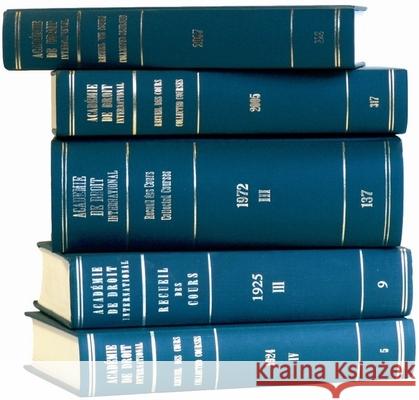Recueil Des Cours, Collected Courses, Tome/Volume 374 » książka
Recueil Des Cours, Collected Courses, Tome/Volume 374
ISBN-13: 9789004297647 / Francuski / Twarda / 2015
Arbitration and State Contract by A. V. M. Struycken: Investments are a major part of international economic relations. Some important investments take place on the basis of a contract between, on the one hand, a State, or a State-controlled body, the Host State, and, on the other hand, a foreign company. Such a contract may represent for the company an important involvement of capital, organization and know-how for a long period of time. The Host State has a clear interest but the Home State of the company cannot remain indifferent. Such contracts are known as State Contracts. Disputes may arise. Courts of either State may not be attractive for both parties to arrive at a satisfactory solution. Arbitration may provide a way out and agreed upon. It is submitted that an arbitral tribunal needs a lex fori as lex facit arbitrum, and that for State contract arbitration public international law is the lex fori. Public international law has to develop a new chapter, attributing a limited legal personality to such companies. Procedure, rules on the applicable law and the authority of the award are, it is submitted, governed by public international law. The ICSID, International Centre for the Settlement of Investment Disputes, based on the Washington Convention on ICSID, 1965, is a leading authority in this field. The Academy has devoted many courses to the subject matter. La rebellion et le droit international: le principe de neutralite en tension, par O. Corten: Traditionnellement, le droit international se caracterise par une certaine neutralite vis-a-vis du phenomene de la rebellion qui n'est, en tant que tel, ni permis ni interdit. Depuis quelques annees, cette position traditionnelle est cependant l'objet de tensions croissantes, qui se manifestent dans deux sens a priori opposes. D'un cote, dans la mesure ou se developpe, depuis les annees 1990, une regle de droit international imposant l'Etat de droit, la remise en cause du gouvernement constitutionnel par la force parait avoir ete progressivement interdite. D'un autre cote, cependant, le renversement par la violence de certaines autorites a la fois legales, mais aussi considerees comme autoritaires ou dictatoriales semble avoir ete accepte et meme favorise par un grand nombre d'Etats et d'organisations internationales, en particulier l'ONU, notamment dans le contexte du printemps arabe . Ainsi pourrait-on envisager l'emergence d'une certaine forme de droit a la rebellion, meme si c'est dans des limites qui restent a definir et a concilier avec les regles qui conferent a l'Etat un droit, voire un devoir, de maintenir l'ordre. Specialement dans ses evolutions recentes, le droit international parait donc entretenir une relation ambivalente avec le phenomene de la rebellion. The Convention and Centre for Settlement of Investment Disputes by A.R. Parra: This course starts with an overview of the origins and development of the Convention on the Settlement of Investment Disputes between States and Nationals of Other States and of the International Centre for Settlement of Investment Disputes. The course then examines the main elements of the jurisdiction of the Centre, key procedural points in Convention arbitrations, and the law applicable to the substance of the dispute in such arbitrations. Throughout, the emphasis is on cases brought to the Centre under bilateral and multilateral treaties on investment. A final chapter discusses Convention annulment proceedings and proposals for other mechanisms for the review of awards rendered in investment treaty arbitrations.











